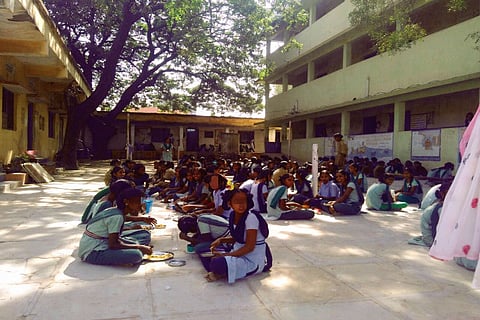

Girls and boys in uniform ran about the playground at noon in the second week of November, before the winter set in. To one side of the unfenced school ground, a group girls aged about 15 were engrossed in a discussion that they had had many times before.
Which packet of chips should they buy? One girl said blue, but another wanted the Lays chips that came in the yellow packet. Once the decision was made, all of them contributed Rs. 5 and bought a packet of chips. Shahbida* too gave her share of the money. The rest of her monthly pocket money would go in buying sanitary napkins, an equal luxury in her eyes.
It takes Shahbida about three months to save Rs 36 (her mother gives her Rs 15 a month), which will buy her a packet of Whisper Choice, which has seven sanitary napkins. Shahbida rations these – she will use two pads per period, i.e., for the first two days when the bleeding is heavy and therefore, the discomfort the most. (A sanitary napkin is generally not supposed to be used for more than four-six hours.)
“For the rest of the days I can use cloth,” she says. She is too conscious to buy the sanitary napkins herself. So, she sends her younger sister, who has no idea what a period is, to buy them for her.
Shahbida is one of just 10% of about 600 girls who use sanitary napkins in two schools in Telangana’s Shamshabad district, according to a survey conducted by NGO Anarghya Foundation in July.
The supply of sanitary napkins announced by Telangana Education Minister Kadiyam Srihari in November 2015, free of cost to girls studying government institutions doesn’t seem to have reached her. The scheme was aimed at around 3 lakh girls studying in Classes VII to XII in over 3,000 government educational institutions.
In the absence of affordable sanitary napkins, most girls, like 14-year old Fatima* use cloth as the ones available in the market are too expensive. Moreover, Fatima too hesitates at the thought of buying sanitary napkins from a male shopkeeper.
The day The News Minute visited her school, Fatima sat with her best friend on the school corridor, while her other friends played in the ground.
Since she hit puberty last year, Fatima has skipped school during the first couple of days of her period. Each time, she has to make up for the missed classes. “I become very conscious, because the red stain is very clear in the uniform,” she says, looking up from her notebook. Her school has a green and white uniform.
Headmistress Sandhya, says that nearly 10% girls have dropped out this year after hitting puberty. “But even those who are still enrolled miss classes during their period. Some of them just attend half the classes in a day and leave,” she adds.
When she does attend school during her period, Fatima often goes home to change the cloth. She washes the used strips of cloth and dries it inside her room so that no male members of her family see it. “If I run out of my own strips of cloth, I borrow my mothers’.”
Most of the interactions with the girls occurred in a room where the girls spoke relatively freely, after some amount of coaxing. But one 15-year-old girl, Mehar, came up to this reporter separately, and said that she uses socks filled with sand, as a sanitary napkin during her period. Such instances appear to be rare.
But regardless of the type of material they used to absorb blood, many girls complained of symptoms that could suggest that they had vaginal infections (burning sensation, rashes, foul smell or discharge), or a urinary tract infection (UTI).
“I get rashes after my period, and a burning sensation while passing urine after my period days. Sometimes, the stomach (abdominal) pain is unbearable, so I usually don’t come to school on the day I get my period,” says Seham.
During the medical camp that Anarghgya conducted in July, the NGO found that a large number of girls had similar symptoms, and that not much has changed in the months since. While poor hygiene during the period is part of the problem, the lack of functioning toilets is also to blame for the symptoms experienced by the girls.
“The girls would never use the toilets in the school, because most of them were damaged. Also, there was no barrier between the boys toilet and girls toilet,” says Harika, founder of Anarghya. The NGO recently renovated the toilets and constructed a wall between boy’s and girl’s toilet, which now gives them some privacy.
The overall situation is not just limited to Shamshabad, but across the state, says Malini Gopalakrishnan of NGO Voice4girls. She says that when they started working in Telangana in 2012, there was no menstrual health hygiene to speak of. Even today, a large number of girls in the state use cloth, she claims.
Chief Program Officer in the Department of Health and Family Welfare Srinivas Rao told The News Minute that the state government was providing sanitary napkins to girls at Rs 6 for a packet in Mahbubnagar Adilabad and Nazamabad districts. He said that in two years' time, it would be rolled out across the state.